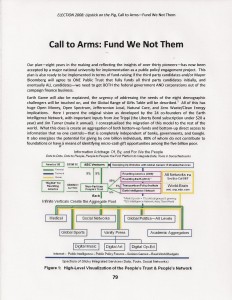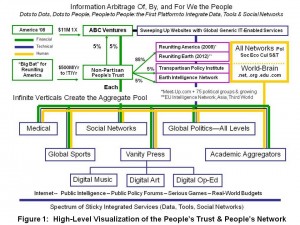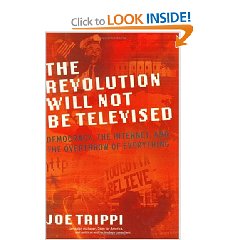Edit of 20 Dec 07 to add links.
Joe Trippi has produced a very fine personal story that clearly presents Trippi, Dean, and the Internet as the people's tool, in the context of “early days.” His big point is in the title: this is about the overthrow of “everything.”
I took off one star for two reasons: his very limited “tie in” to the broad literature on the relationship between the Internet and a *potentially but not necessarily* revitalized democracy; and his relative lack of attention to the enormous obstacles to electronic democracy getting traction, including the corruption of the entire system from schoolhouse to boardroom to White House.
There is a broad data point that Trippi missed that adds great power to his personal appreciation of the future: the inexpensive DoKoMo cell phone and network approach from Japan, when combined with Sony's new playstation that is connected to the Internet and opens up terabytes on online storage to anyone with $300, and to this I would add […]semantic web and synthetic intelligence architectures–these all combine into finally making possible the electronic connectivity of poor and working class voters, not just the declining middle class and the wealthy. 2008 is the earliest that we might see this, but I suspect it won't be until after two more 9-11's, closer to 2012.
There are a number of gems throughout the book, and I will just list a few phrases here:
— politics of concentric circles–find the pebble in every town
— polling substitute's conviction for bullshit (his word)
— citing Robert Putnam in “Bowling Alone,” every hour of television watching translates to a 10% drop in civic involvement
— what gets destroyed in scorched earth politics is democracy
— McCain led the way for Dean in using the Internet and being an insurgent (“the Republican branch of the Republican Party”)
— the dirty secret of US politics is that fund-raising (and I would add, gerrymandering) take the election decision out of the hands of voters
— the existing party machines are dinosaurs, focused on control rather than empowerment–like government bureaucracies, they cannot accept nor leverage disruptive innovation (see my review of “The Innovator's Solution”)
— Open Source Rules–boy, do I agree with him here. He describes Dean's campaign as the first really committed “open source” campaign, and this is at the heart of the book (pages 98-99). One reason I have come to believe in open source software, open source intelligence, and open spectrum is that I see all three as essential to the dismantling of the Maginot line of politics, institutional dominance of money and votes on the Hill.
— Media will miss the message. He has bitter words for the media spin and aggression that helped bring Dean down, but his more thoughtful remarks really emphasize the mediocrity of the entertainment media and its inability to think for itself.
— TIRED: transactional politics. WIRED: transformational politics
— Democratic fratricide killed Dean–Gephardt on his own, and Clark with backing from Clinton, killed the insurgency
— Cumulative Intelligence is a term that Trippi uses, and he puts in a strong advertisement for Google's gmail that I found off-putting. Googling on the term “collective intelligence” will get one to the real revolutionaries. When he quotes Google as saying it will “harness the cumulative intelligence of its customers” this reminds me of my own phrase from the early 1990's, one Mike Nelson put in one of Al Gore's speeches, about the need to harness the distributed intelligence of the Whole Earth. My point: we don't need Google to get there–collective intelligence is already happening, and Google is a side show.
Tripi's final chapter has “seven rules”: 1) Be first; 2) Keep it moving; 3) Use an authentic voice; 4) Tell the truth; 5) Build a community; 6) Cede control; 7) Believe again.
There are a rather lame few pages at the end on Change for America. Forget it. Change for America is going to be bottom-up, from the county level.
I want to end by noting that at one point, on page 156, I wrote in the margin, “this is a moving book,” but also express my frustration at how unwilling Dean and Trippi were to listening to those of us (Jock Gill, Michael Cudahay, myself), who tried very hard to propose a 24/7 team of retired Marine Corps watchstanders with structured staff processes; a massive outreach to non-Democratic voters including the 20$ of the moderate Republican wing ready to switch. On page 161 Trippi writes “The truth is that we never really fixed the inherent problems in the organization that I saw that first day….” I could not help but write in the margin, “We told them so.”
The problem with Dean and Trippi is they became enchanted with the blogs and the newness of its all–as well as the fund-raising–and lost sight of the fundamentals. The winner in 2008 or 2012 will have to strike a better balance. One other note: the revolution that Trippi talks about is sweeping through Latin America, with active Chinese, Korean, and Japanese interest. It is just possible that electronic populism will triumph in Latin America before public intelligence becomes commonplace in America.
See also:
A Power Governments Cannot Suppress
One from Many: VISA and the Rise of Chaordic Organization
Society's Breakthrough!: Releasing Essential Wisdom and Virtue in All the People
The Tao of Democracy: Using Co-Intelligence to Create a World That Works for All
The World Cafe: Shaping Our Futures Through Conversations That Matter
The Cultural Creatives: How 50 Million People Are Changing the World
Collective Intelligence: Mankind's Emerging World in Cyberspace
Group Genius: The Creative Power of Collaboration
All Rise: Somebodies, Nobodies, and the Politics of Dignity (BK Currents)
Escaping the Matrix: How We the People can change the world










